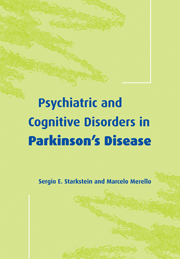Book contents
- Frontmatter
- Contents
- Preface
- 1 Introduction
- 2 Epidemiologic, clinical, and therapeutic aspects of Parkinson's disease
- 3 Parkinsonism and Parkinson's disease
- 4 Cognitive deficits in Parkinson's disease
- 5 Depression in Parkinson's disease
- 6 Anxiety, phobias, apathy, and premorbid personality in Parkinson's disease
- 7 Neuropsychologic and psychiatric side-effects of antiparkinsonian medication
- 8 Treatment of psychiatric disorders in Parkinson's disease
- Appendix
- References
- Index
6 - Anxiety, phobias, apathy, and premorbid personality in Parkinson's disease
Published online by Cambridge University Press: 13 August 2009
- Frontmatter
- Contents
- Preface
- 1 Introduction
- 2 Epidemiologic, clinical, and therapeutic aspects of Parkinson's disease
- 3 Parkinsonism and Parkinson's disease
- 4 Cognitive deficits in Parkinson's disease
- 5 Depression in Parkinson's disease
- 6 Anxiety, phobias, apathy, and premorbid personality in Parkinson's disease
- 7 Neuropsychologic and psychiatric side-effects of antiparkinsonian medication
- 8 Treatment of psychiatric disorders in Parkinson's disease
- Appendix
- References
- Index
Summary
The French neurologist Charcot (1875) was the first to describe a specific emotional profile among patients with PD, and considered that both emotions and hereditary factors may play an important role in the mechanism of PD. During the past five decades numerous studies have examined the presence of typical personality types in PD and findings have been quite varied, from reports denying a “typical” personality profile (Glosser et al., 1995) to those describing PD patients as “industrious individuals with high moral standards” (Camp, 1913). PD itself was described as an “illness of the ambitious, moralistic man” and the result of “suppressed hostility” (Dakof & Mendelsohn, 1986). Some studies described specific personality traits such as industriousness, punctuality, inflexibility, and cautiousness as emerging well in advance of the onset of motor symptoms (Poewe et al., 1983), whereas others described a significant personality change only after the onset of Parkinsonian signs (Hubble et al., 1993; Menza et al., 1993a). Together with personality changes and a high prevalence of depression (already discussed in chapter 5), symptoms of anxiety, phobias, and apathy have also been recognized as very prevalent emotional and behavioral disorders in PD.
This chapter will review the evidence on specific personality traits, as well as the prevalence, clinical correlates, and potential mechanisms of anxiety disorders and apathy in PD.
Premorbid personality in PD
Early studies of personality traits in PD were framed on a psychoanalytic perspective. (Hubble & Koller, 1995, provide a thoughtful discussion of these works.)
- Type
- Chapter
- Information
- Psychiatric and Cognitive Disorders in Parkinson's Disease , pp. 114 - 128Publisher: Cambridge University PressPrint publication year: 2002



